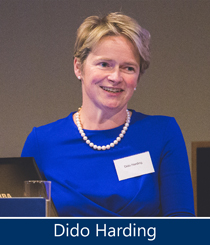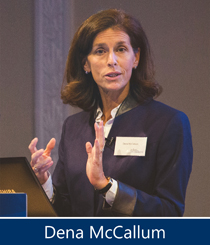Disruptive innovation: successful challenger CEOs discuss perspectives at Eden McCallum event
Dominating a market is a great thing – until, suddenly, you don’t. An apparently healthy market position can be undermined fast. Success does not really prepare you for this. That is one of the reasons why incumbents can be vulnerable to disruptive innovators. Incumbents just don’t see them coming.
Many firms would like to see themselves as disruptors or, alternatively, would like to know how to protect their dominant position from being disrupted. So successful disruptors may have something to teach us.
Last month Eden McCallum hosted a stimulating discussion and debate on this question of disruptive innovation. Our four speakers were:
Adam Balon, co-founder of Innocent Drinks, now jointly leading JamJar Investments, a VC fund
Dido Harding, chief executive officer of the internet TV, broadband and phone business TalkTalk Group
Brent Hoberman, co-founder of Lastminute.com, and serial entrepreneur
Richard Johnson, senior vice president, strategy, for Monitise, the mobile banking and payments services business *
Each speaker shared a little of their experience and insight into innovating and disrupting markets, challenging the happy dominance of other players or simply bypassing them to carve out new markets of their own.

Dido Harding explained that the sledgehammer of a “free” broadband offer had proved massively disruptive to BT and other home internet providers when TalkTalk launched this in 2006. “Free works really, really well,” she said, “in fact, it can work too well.” The company hit its six month target for new business in under two weeks. The company disrupted not only the market but itself. It was an “incredibly powerful” moment, Harding said.
TalkTalk’s relationship with BT is interesting. “They are our supplier, our competitor and the reason we exist,” Harding said. Grasp where you stand relative to incumbents.
Bold acquisitions, like that of Tiscali in 2009, can help build market share, but: “The integration of Tiscali nearly killed us,” Harding admitted. “Sometimes not knowing too much can help you do stuff,” she said.

Having shaken up incumbents, TalkTalk wants to stay sharp. “We worry a lot about becoming the next incumbent,” Harding said. “We zig where the world zags. People sometimes think we are nuts. Innovation can mean introducing a product that turns out to be right that everybody else thinks is wrong,” she said. “Of course,” she added, “sometimes if the world is zagging there could be a good reason for that.”
Brent Hoberman said that the vision of lastminute.com was to be disruptive. His company was the first to launch the “dynamic packaging” of concealed elements to offer one price for a holiday. Customers got a better deal through this bundling of items. This was flexible and new and something the competition was unable to cope with.
Speed and opportunism were vital to lastminute.com’s approach. “We scraped easyjet and Ryanair data [prices] without asking them,” Hoberman said. “This was, arguably, criminal! I used to joke with my marketing team: ‘If you’re in prison I know you are doing your job properly!’ ”
He agreed with Harding: “If we had known how hard it was going to be we wouldn’t have done it.”

Richard Johnson said that it was not new technology in itself that necessarily disrupted incumbents: it has to be new technology that helps. “Our space is littered with technology that doesn’t help,” he said. Monitise has cut through with its support for “the humble [bank] balance enquiry”.
Banks can change the story, Johnson said, avoiding becoming a victim to disruption effectively by disrupting the market themselves. The risk is that banks become a “dumb pipe” – they have to offer new mobile services intelligently to fend off disruptors.
Adam Balon said that Innocent was partly motivated by the desire to build a business the founders could be proud of. Smoothies were not a new thing, but their approach was. They disrupted the market with their attitude as much as their product.
Innocent was “a social brand before social media existed”, Balon said, drawing on spontaneous customer feedback and an “open house” policy which welcomed visitors to their HQ, Fruit Towers. It was “a brand that spoke to people”.

Competitors copied Innocent products cynically and failed. “We weren’t a problem for them at first, but after ten years we were,” Balon said. And he shared Dido Harding’s view about naivety. The founders of Innocent were truly…innocent. “Naivety is incredibly valuable,” he said. “We really didn’t know anything when we started, and probably if we had known more we wouldn’t have done it.”
Dena McCallum led the panel into a broader discussion: why do incumbents allow themselves to be disrupted? Brent Hoberman said that in his case Thomas Cook were not able to copy lastminute.com, and didn’t want to compete with them. The incumbent’s attitude to risk is crucial. If there is less incentive to succeed and more incentive to avoid failure – a typical state of affairs in a larger corporation – there will be less innovation.

Dido Harding agreed that TalkTalk has a high appetite for risk and is happy for things to go wrong. They like to move fast, something that BT inevitably finds harder to do. Big corporations also tend to have an established view of the world, which can be hard to shake or challenge. That is the incumbent’s dilemma, she said.
How can an incumbent recreate an appetite for risk? Adam Balon said Innocent put a clever entrepreneurial person in charge of new stuff and didn’t try to stop them.
Brent Hoberman suggested working with start-ups and spin-offs to try and capture the risk-taking spirit. And allow new ventures to grow – the Tinder app came out of match.com, he pointed out.
Size can block innovation. “When we got to 2,000 people I got frustrated that we couldn’t innovate,” Hoberman said. He chose to set up separate budget lines to help promote new ideas. Big corporates tend to reward people for cost-cutting, not trying new things, Hoberman added.
As you grow it can be hard to stop the fear of failure coming in, Harding admitted, so it is not easy to be a “serial disruptor”. At TalkTalk she tries to inculcate a sense of purpose beyond making profits: they are trying to save their customers money too. She has a “love of the game” and enjoys poking authority in the eye. 60% of her staff are shareholders – this helps in aligning people to the purpose of the business. Get the right shareholders, Harding added.
Following the event, Chris Tchen, an Eden McCallum client director who focuses on innovation, cautioned, “It’s not that incumbent companies don’t see disruption coming, but rather that their governance, financial and risk management systems all unwittingly conspire to suppress action. All too often senior managers and board members can watch disruptive innovations arriving and think ‘I’m glad I’ll be gone before that arrives.’”
End thought: As Linda Rottenberg of Endeavor says in her new book “Crazy is a compliment” – “Most of the world’s CEOs realise they have to disrupt their own organisations before others beat them to it.”

